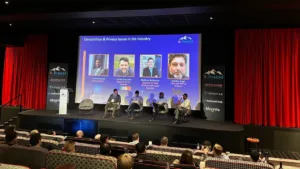By Karan Singh, Head of Advertiser Partnerships, Tech Sales, Microsoft Advertising
Since it began, the digital advertising world has honed their skills to deliver the right message to the right person, at the right time. We have progressed from using something as seemingly innocuous as third-party cookies, to better understanding site traffic, to being able to track and target users across multiple sites with precision, and at scale.
This innovation has come with a price, leading us to a bloated ecosystem with third-party trackers causing ID fragmentation, loss in fidelity and the proliferation of fraud across the ecosystem.
Privacy and identity are not incompatible with personalised advertising or creating meaningful relationships with customers, but rather essential components of a successful and sustainable digital ad ecosystem. It’s time we give data control back to the customer and create a healthy ecosystem that preserves privacy in a way that both the consumers, and marketers, can flourish.
Data vs Human
When we think of the ‘authenticated universe’ we think of signed in users, who have explicitly opted-in or logged into a website whether through a pay or registration wall. This affords marketers personal identifiable information that is collected, managed, enriched, and then activated against. With closer partnerships between digital buyers and sellers, advertisers can now use permissioned data to match their users across publisher first party inventory, leading to a more relevant advertising experience for the end user. That’s great… in theory.
A ‘user’ is a term commonly used by us in the digital world. In its simplest definition a user is a person who “uses or operates something such as a product, machine or service.” But a user can also be described as an “addict” or “a person who exploits others,” which makes the term take on a more sinister feeling. It’s because of this connotation that we must move away from this term to prioritise the human behind the data.
The VIP treatment
Mckinsey’s most recent report from 2021 showed seventy-one percent of consumers expect companies to deliver personalised interactions, and seventy-six percent get frustrated when this doesn’t happen, suggesting their open-ness to a fair exchange with businesses.
Yet the ability to personalise our day-to-day lives has reached new heights. Far from feeling frustrated, we as consumers should be receiving the ‘VIP’ treatment. Thanks to advancements in artificial intelligence and machine learning it is easier to come by. From recommendation engines to voice activated assistants, our individual worlds are evolving to allow each person to enjoy experiences in the way they want and that is most comfortable for them.
Offering a ‘VIP treatment’ works in brands’ favour too. A satisfied customer can often drive new leads to the business, reducing customer acquisition costs. In fact, businesses focused on improving their customer experience have seen an 80% increase in revenue. Many brands with access to their own first-party data can leverage this to create bespoke, personalised communication with the right individual at the right moment and, given the proliferation of ways to engage with consumers today, the right channel.
For brands without first-party data this level of personalisation is harder to activate, but not impossible. Partnerships are key. A notable example is Channel 4 who signed a pioneering data partnership with Nectar 360 earlier this year. This allows FMCG (fast-moving consumer goods) brands who use the Nectar360 segments to tailor their adverts on All 4 to groups of viewers, based on similarities across their recent shopping habits with Sainsbury’s supermarkets.
This offers an engaging medium for all. A clear and fair value exchange for the customer – personalisation for points – as well as a more relevant advertising experience across All 4 content. And for advertisers, the right measurement mechanic for them to understand exactly how effective their campaign efforts were.
Playing the long game
Balancing consumer privacy with advertising performance and measurement represents the mother of all challenges for advertisers. We cannot hide from the fact that without measurement, performance as we know it ceases to exist.
The reality of privacy is that regulators will continue to pass more laws to ensure consumer rights are protected and rightly so. But if we revisit the reason why we are here – to deliver the right message, in the right place, at the right time – advertisers now have the capabilities to execute against this across multiple formats and channels, through a mix of first-party data, innovative partnerships and, crucially, a longer-term vision (I recommend Les Binet’s “The Long and Short of It” for more detail on this.
If the term ‘users’ is associated with addiction, then marketers need to get ‘off the drug’ when it comes to tracking and ask their agencies more pointed questions about the strategy/testing framework for the new future. Ask about getting closer first-party data partnerships with media owners who can help you win with customers, without losing sight of how you measure success. Lastly, let’s think like customers ourselves again, using our own personal viewpoint to determine what works and what doesn’t.
Perhaps a good place to start is by asking yourself “does this make me feel like a VIP, or just feel a bit weireded out?”









